* You are viewing Posts Tagged ‘Databases’
James Brown
January 30, 2012
Events, Front Page, Project Updates, Videos
Tags: CKCC, Databases, Digitization, Geography, Mapping the Republic of Letters, Networks, Spatial Theory, Union Catalogue, Union Catalogue News, Visualization

Videos of twenty-one papers and keynotes from our 2011 conference Intellectual Geography: Comparative Studies, 1550-1700 (Oxford, 5-7 September 2011) are now available on the conference website or via our Vimeo channel (with more hopefully to come). Organised by Howard Hotson, the event introduced and tested the novel concept of ‘intellectual geography’ as a means of appreciating and understanding the organisation of intellectual activity and the dissemination of ideas within space and across time, from the sixteenth to the eighteenth centuries. A taster – Miles Ogborn‘s keynote exploration of ‘What is Intellectual Geography?’ – is provided below. Happy viewing!
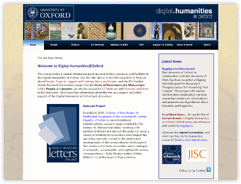 We were this week’s featured project on Digital.Humanities@Oxford, meaning a coveted front-page slot for a brief description of Cultures of Knowledge and the logo for our union catalogue, Early Modern Letters Online. Recently given a facelift and some important new functionality, DH@O is a central hub for information about relevant activities, resources, and activities in Oxford – one of the most established centres of digital humanities in the world – and features a growing relational database of people and projects involved.
We were this week’s featured project on Digital.Humanities@Oxford, meaning a coveted front-page slot for a brief description of Cultures of Knowledge and the logo for our union catalogue, Early Modern Letters Online. Recently given a facelift and some important new functionality, DH@O is a central hub for information about relevant activities, resources, and activities in Oxford – one of the most established centres of digital humanities in the world – and features a growing relational database of people and projects involved.
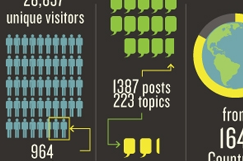
Detail from the graphic.
Melissa Terras from the UCL Centre for Digital Humanities has, with the support of the UCLCDH, created a wonderful infographic of this exciting field. While not completely comprehensive, the visualization combines data from a wide variety of online sources across a range of measurable criteria, and is definitely worth a look. The infographic is available via the UCLCDH Flickr Stream or as a print download (pdf).
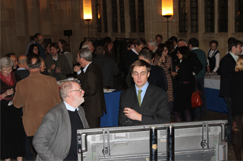
EMLO screenshots captivate the crowd.
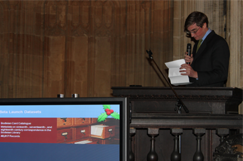
Chris Fletcher sets the scene.
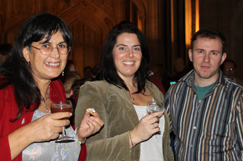
Festive designers and programmers.
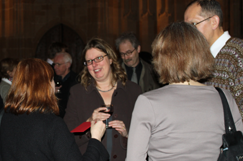
The Lister and Lhwyd research teams.
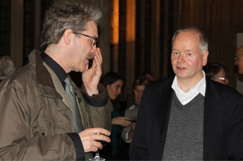
Stephen Clucas and Philip Beeley.
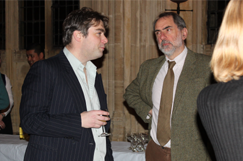
Will Poole and Richard Sharpe.
After a very busy year in private alpha, the Project celebrated the imminent public beta launch of our free union catalogue – Early Modern Letters Online − with a festive reception last Friday. Over eighty students, scholars, librarians, and digital humanists joined us in the historic environment of the Bodleian Library‘s Divinity School, where – over mulled wine, seasonal canapés, and mince pies – they were treated to contextual remarks from Dr Chris Fletcher (Keeper of Special Collections) and Professor Howard Hotson (Director of Cofk), and a full demonstration of the capabilities of the catalogue’s search and discovery, and editorial, interfaces by Project Coordinator Dr James Brown. Many thanks to everyone who contributed to the success of the evening, with a special shout-out to the Bodleian’s Wilma Minty for arranging things with her usual flair.
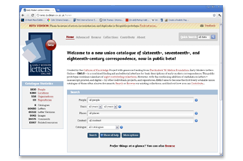
The EMLO homepage.
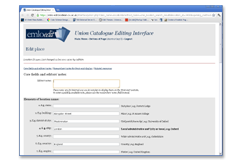
EMLO Edit, the editorial interface.
Early Modern Letters Online – which currently contains 60,480 epistolary records – federates basic metadata from eight contributing sources (including 48,695 sixteenth-, seventeenth-, and eighteenth-century records drawn from the existing card index of correspondence in the Bodleian Library), and allows for their manipulation and further enhancement by means of a sophisticated editorial environment. It will be available to the public from early January 2012.

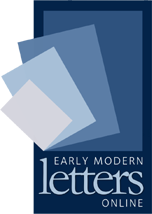 To stay informed, please watch this space or join the Mailing List. In the meantime, we wish you all a very Happy Holidays!
To stay informed, please watch this space or join the Mailing List. In the meantime, we wish you all a very Happy Holidays!
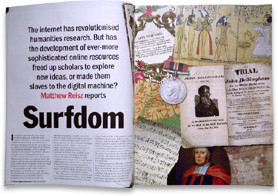 Cultures of Knowledge was featured in a THE survey of digital humanities projects last week. CofK was interviewed alongside staff from the Digital Miscellanies Index, the Old Bailey Online, Linguistic Geographies: The Gough Map of Great Britain, DigiPal, Ancient Lives, the Online Chopin Varorium Edition, and the DIAMM. Here’s how the article described the Project:
Cultures of Knowledge was featured in a THE survey of digital humanities projects last week. CofK was interviewed alongside staff from the Digital Miscellanies Index, the Old Bailey Online, Linguistic Geographies: The Gough Map of Great Britain, DigiPal, Ancient Lives, the Online Chopin Varorium Edition, and the DIAMM. Here’s how the article described the Project:
‘A remarkable project titled Cultures of Knowledge: An Intellectual Geography of the Seventeenth-Century Republic of Letters seeks to reconstruct pan-European intellectual networks by creating a modern equivalent. Many leading thinkers of the time were forced by war to flee from their homes and so left their papers all over the Continent. The digital revolution and the collapse of the Soviet Union, says Howard Hotson, professor of early modern intellectual history at the University of Oxford, have enabled a team based in Oxford (with support from the Andrew W. Mellon Foundation) to build ‘radically multinational forms of international collaboration of a kind which was effectively impossible before’, so as to reassemble in virtual form long-scattered learned correspondences. The project should transform the study of topics such as the Scientific Revolution…’
The article – mischievously entitled ‘Surfdom’ – goes on to raise some important caveats about electronic forms of humanistic research, even though for most digital projects these will serve as reminders of pitfalls and best practice rather than highlights of new or emerging issues. The emphasis on the necessity of crafting digital tools both in the service of research questions and alongside more conventional modes of scholarship is very much up our street as a full-spectrum academic enterprise, while some of the author’s concerns regarding the accessibility, sustainability, and especially accountability of large-scale online resources are also well-taken. Here’s the article; there’s a lively debate in the comments section and on Twitter.
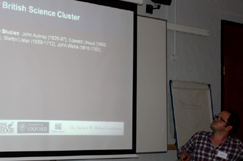
James introduces the Project.
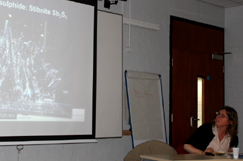
Anna Marie describes stibnite.
The Project was on the road again this week, this time at the venerable Reading Conference in Early Modern Studies, which this year took as its theme ‘Communication and Exchange’ (University of Reading, 18−20 July 2011). On Monday afternoon, a panel devoted to CofK comprised three interlocking papers. Project Coordinator James Brown provided an overview of the Project and its intellectual objectives, Research Fellow Anna Marie Roos delivered a wonderful case study of Martin Lister‘s hitherto unsung contributions to Newtonian telescopy, while Editor Kim McLean Fiander introduced our union catalogue of early modern correspondence and treated delegates to a sneak preview of its editorial and search interfaces. In the evening, Project Director Howard Hotson concluded our contribution with a plenary address on the multi-layered network of Samuel Hartlib. In a wide-ranging analysis, Howard recapitulated some of the broader objectives of the Project, before describing the way in which Hartlib’s legendary intelligencing both superimposed and reflected the pedagogical, diplomatic, commercial, and military networks engendered by the upheavals of the Thirty Years War. For more information about the conference, please download the programme (pdf).
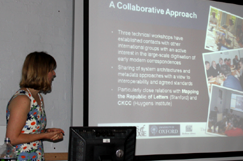
Kim introduces the catalogue.
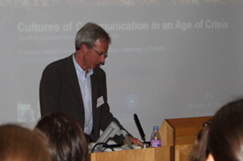
Howard's keynote on Hartlib.













 To stay informed, please
To stay informed, please 





 Join
Join 